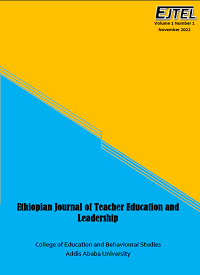Emergency Education’ in Sweden: Implications for Sustainable Development through Education for Newly Arrived Students
DOI:
https://doi.org/10.20372/ejtel.v1i1.7639Abstract
This article reports part of a research project that investigated the learning and social inclusion conditions of ‘newly arrived students’ in Swedish primary schools in two municipalities. Newly arrived students are the category of students who have lived abroad and started their education in Sweden when they were seven years old or older within the last four years. Most of these children and youth have a history of migration. This article focuses firstly on the Swedish migration context, the ‘migration crisis’ in 2015 and the changes in the Swedish reception system that took place soon thereafter and, second, ethnographic observations from Primary Schools of two specific perspectives in education, namely a perspective on ‘Framing of the day and the lesson’ and ‘Study tutoring in the mother tongue in regular teaching’. The results indicated that strong supporting structures and structured social interaction are needed as well as caring and empathy on the part of teachers to promote learning and social inclusion of newly arrived students are required. Furthermore, study tutoring in the mother tongue in regular teaching seems to be important while the study tutors’ view of their mission varies.
